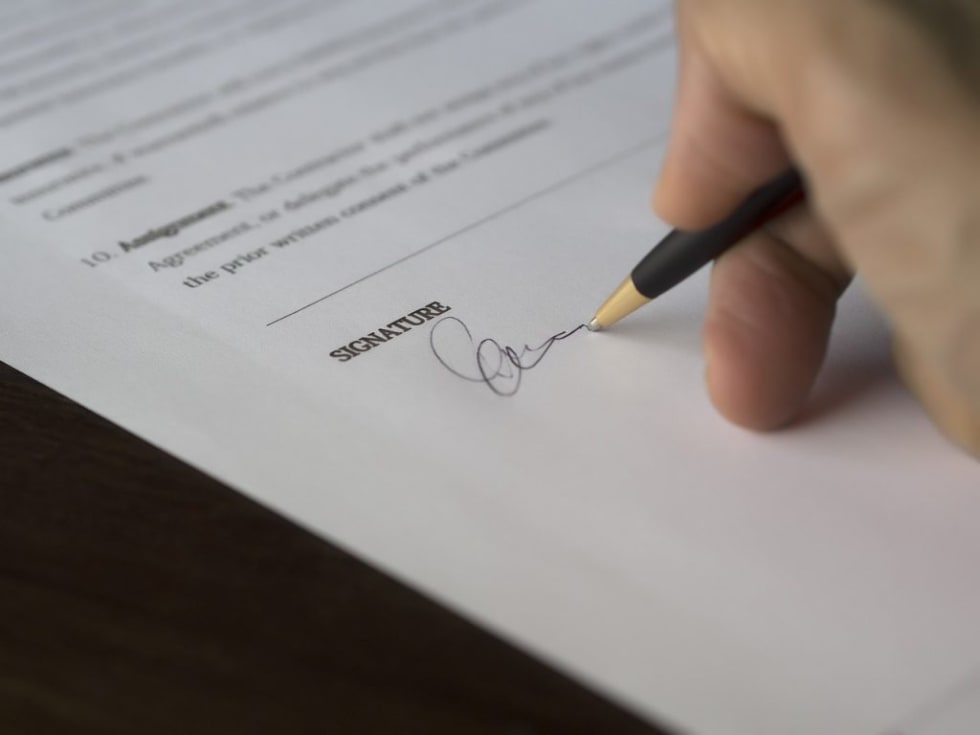- 47 units available
- 1 bed • 2 bed • 3 bed
- Amenities
In unit laundry, Hardwood floors, Dishwasher, 24hr maintenance, Stainless steel, Walk in closets + more

If you’ve received an estoppel certificate from your landlord, you may have some burning questions. Perhaps you’re unsure what such a document entails or how it affects you and your current living situation.
Additionally, you may not be sure whether you’re obligated to sign it, when to sign it, or how to approach reviewing an estoppel certificate.
Don’t worry. We’ve got you covered with everything that you need to know about estoppel certificates and what to do if your landlord asks you to sign one. Check out our in-depth guide below.
When a landlord with a tenant engages a third party for some type of real estate activity involving the leased space, an estoppel certificate is used to confirm the current conditions of a lease. It is an agreement that the tenant will either create or sign that confirms key elements of a lease such as duration, monthly rent, and security deposit amount.
In short, an estoppel letter is a summary of the most important clauses within the lease. It provides an accurate, factual snapshot of the status of a lease. Tenants sign them in order to confirm the accuracy of the lease standards as described in the certificate.
Usually, a real estate estoppel letter is only about a page in length. So it’s easy to review and won’t take up much of your time. Once you’ve signed a tenant estoppel certificate, you verify that the terms of the lease are correct and you and your landlord have agreed to them. After you sign such an agreement, you won’t have the ability to make any claims that don't support the claims that the certificate details.

There could be many reasons why a landlord might request that you sign a tenant estoppel certificate, but a common one is for the purpose of securing a loan to provide cash flow to their operations. Landlords also use them when the owner of the property wants to sell it, and the buyer wants to know the status of all active leases.
This way, the buyer can make sure that tenants don’t have any claims against the landlord—meaning that they could withhold or offset future rent payments.
Interested in learning more about the legal applications of estoppel certificates? Check out this expert breakdown from Cluff Injury Lawyers:
An estoppel certificate contains several pieces of information. First, it identifies the tenant and the landlord, along with the address of the apartment you are renting. It also includes the start date and end date of your lease. The document also further indicates any prepaid rents and/or security deposits.
An estoppel letter also highlights whether either party has defaulted on any responsibilities or rights under the lease. This will also detail your contact information as well as that of the landlord. If there are any existing renewals or extensions, the estoppel letter will also include those terms.
In most cases, all parties benefit from estoppel agreements. When someone is trying to buy a property from your landlord, the buyer needs to do their due diligence. They’ll want to ensure that the terms of the lease are set in stone, to avoid any unexpected expenses.
If the tenant would just be able to say, "Oh, no, I didn't pay $1000 a month, I pay $750," landlords would run the risk of someone swindling them. Or, for example, if your previous landlord allowed you to have a cat even though your lease has a "no pets" clause, you may be out of luck.
Without a tenant estoppel certificate that you’ve signed, your new landlord has no obligation to uphold this agreement. However, when you sign it, the buyer won't have any doubt over the proper enforceable clauses.
Additionally, if the current tenants have any ongoing legal claims against the landlord, those would transfer over to the buyer. That’s why it’s in the buyer’s best interest to request tenant estoppel certificates.
For example, if your landlord had promised to fix your dishwasher or repaint the entire exterior, the buyer must be aware of these promises. There's nothing worse than an unfulfilled request and a new owner who knows nothing about these claims. It's a surefire way to start off on the wrong foot.

When you receive a request to sign an estoppel certificate, you shouldn't just sign it blindly. Instead, see the request as an opportunity to revisit your lease and double-check all of the agreed-upon clauses. So take an hour out of your day to pull out your lease and the certificate.
Read over both documents and mark up all consistencies, as well as inconsistencies. Are there any contradicting statements? Are all important aspects of your rental agreement clearly stated and accurate? If you see any information that doesn't match up, you need to speak to your landlord.
Whether you are obligated to sign an estoppel certificate depends on your lease, as well as local estoppel real estate statutes. Many leases contain a provision that details the tenant's obligation when it comes to signing this document.
It will likely detail how many days you have to sign the estoppel certificate. Not doing so causes you to default on your lease agreement.
If you’re still waiting for a new refrigerator, or new floors in an area of the home that your landlord had promised to install, you need to note these verbal agreements. An estoppel certificate needs to be a comprehensive overview of all expectations and contingencies that your current rental situation involves.
Doing your due diligence pays off. If there’s ever any legal scenario involving the property, the court will consider the estoppel certificate to be evidence. If you thought your lease was the only document that mattered, think again.
Signing an estoppel certificate will override the terms of the lease. Therefore, it’s important to cross-check both your lease and the agreements that the document outlines. Once you’ve signed it, you can no longer point to the lease when your current or new landlord breaches a part of that contract. The estoppel letter takes its place.
If you're uncertain about when to sign and deliver the estoppel certificate to your landlord, consult your lease. If it doesn't provide you with a time frame, give your landlord a call.
In the event that your lease doesn’t stipulate such a requirement, you may not have to sign an estoppel certificate. However, you won't know for sure unless you consult state-specific or county-specific legislation regarding real estate transactions.
Sometimes, local municipalities will outline expectations for tenants and landlords. These may include an obligation on the tenant's behalf to fill out an estoppel certificate per the landlord's request.
Even if you cannot find a legally-binding statement in the lease or in state law that requires you to sign, it’s in your best interest to do so. However, don’t make the mistake of signing it before you review a few things.
First, review the set of agreements you've made with your landlord. Be sure to take inventory of any agreements that might've been made orally, casually over email, or during a phone call. If any of these agreements contradict provisions that the lease states, you have to correct or add those in.
For example, if you have a pet, even though the lease states that pets are not allowed, the estoppel certificate needs to include this revision. Additional examples of non-materializedagreements include free use of a parking spot, free use of a storage area, permission to sublet, and permission to have a roommate.
There are numerous agreements that people make with their landlords that they haven’t written down or recorded. Regarding timeliness, contact your landlord if you're willing to sign the estoppel certificate. That way, you’ll know when they need it.

If you refuse to sign the agreement, your landlord may reserve the right to sign it for you as your agent. Or the landlord can deem your failure to sign as an admission that the statements within the certificate are true.
In the worst-case scenario, there may be financial penalties or fees that your landlord charges you. If your landlord has included language directed at estoppel certificate requests, it's best to sign the certificate after reviewing the specific clauses and contingencies.
In summary, signing an estoppel letter doesn't put you at any risk or disadvantage. As long as the terms it specifies are accurate and correctly represent your current agreements with the landlord, you don't need to lose any sleep over it.
If you blindly sign it without double-checking, though, you could run into trouble if your current landlord sells. The new landlord is under no obligation to honor non-written agreements unless the estoppel certificate includes them.
Though paperwork can be tedious, signing an estoppel certificate is a simple process of fact-checking, taking inventory of previous agreements or amendments, and voicing concerns about any discrepancies. Remember to account for any promises your landlord has made, big or small.
If you're looking to move on from your current apartment or home, Apartment List can help. Take our easy quiz to get matched with a great apartment in your budget, or flex your choices to explore the surrounding area.


In unit laundry, Hardwood floors, Dishwasher, 24hr maintenance, Stainless steel, Walk in closets + more
In unit laundry, Granite counters, Pet friendly, Stainless steel, Walk in closets, Gym + more